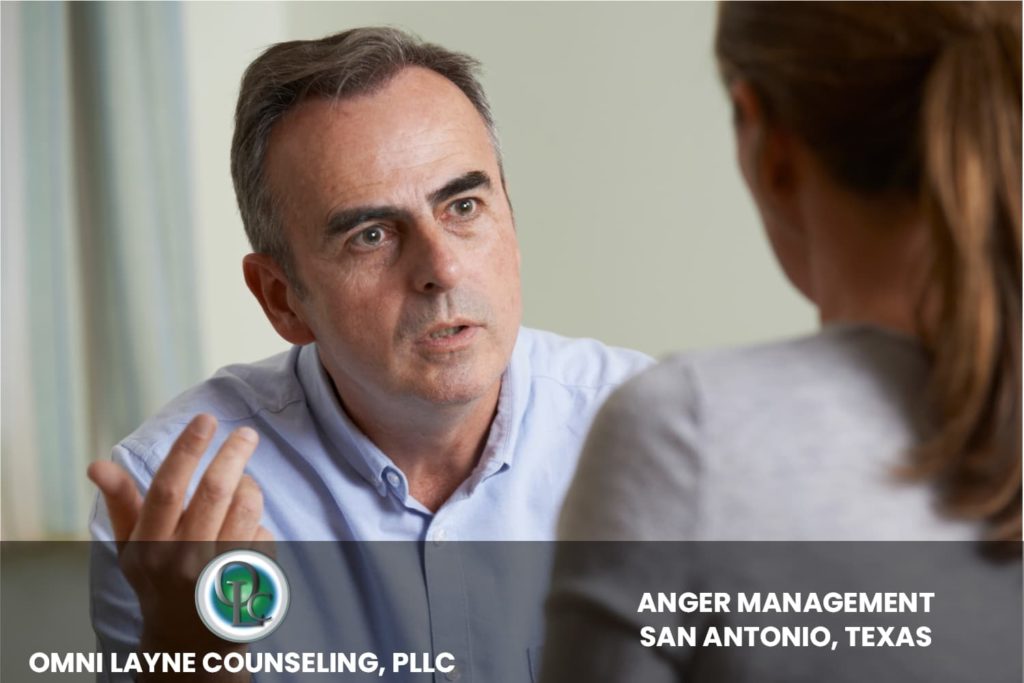Anger Management
with Omni Layne Counseling, PLLC
3740 Colony Dr #122, San Antonio, TX 78230, United States
Located in Colonies North Professional BLD

Anger is a fundamental human emotion, much like happiness, sorrow, worry, or disgust. These emotions are linked to basic survival and have been developed throughout human history.
Anger is associated to the sympathetic nervous system’s “fight, flight, or freeze” reaction; it prepares humans to battle. Fighting, on the other hand, does not always entail throwing punches. It may inspire communities to fight injustice by enacting new laws or enforcing new norms.
Of course, if anger is used excessively or regularly, it can strain relationships and harm one’s physical health in the long run. Prolonged production of stress chemicals associated with rage can kill neurons in brain areas associated with judgment and short-term memory, as well as weaken the immune system.
Learning skills to identify and navigate this powerful emotion can lead to growth and change for those who deal with chronic anger or who just have occasional outbursts.
The mystery of why some people shrug off annoyances while others erupt in wrath is interesting. One model of anger proposed by psychologist Jerry Deffenbacher contends that anger is caused by a combination of the trigger event, the individual’s characteristics, and the individual’s assessment of the circumstance.
The incident that causes the rage, such as being cut off in traffic or being screamed at by a parent, is referred to as the trigger. Individual characteristics include narcissism, competitiveness, and a low tolerance for frustration, as well as pre-anger symptoms such as nervousness or weariness. Perhaps the most crucial aspect is cognitive appraisal—classifying a situation as blameworthy, unreasonable, punitive, and so on. The interaction of these elements influences whether and why people become enraged.
According to research, the proclivity to become angry is connected with high neuroticism and poor agreeableness. Aside from the Big Five personality traits, a few habits and attitudes may be associated with rage. These are some examples:
• Entitlement (the belief that one’s rights and privileges are superior to those of others)
• Concentrating on matters over which one has no control (such as a partner’s behavior).
• External emotional regulation (attempting to control one’s environment in order to regulate one’s emotions)
• The locus of control is external to the individual (believing well-being is controlled by sources outside of oneself)
Refusal to consider alternative viewpoints (viewing different perspectives as threats)
• Inability to tolerate discomfort.
Inability to tolerate uncertainty
• An obsession with blaming
• A frail sense of self
Anger is a fundamental emotion, but it can appear in a variety of ways depending on its origins. Human rights abuses or an abusive relationship are two examples of situations when a person may feel justified in being angry. Justifiable rage can have a short-term positive effect by motivating people to take action.
Anger and annoyance might be sparked by the many problems we face on a daily basis. The expression of aggressive rage is used when someone tries to exert dominance or manipulation over another person. Unreasonable and unsuitable desires or wants can trigger temper tantrums, which are disproportionately violent outbursts of rage.
Most people don’t understand the complicated interplay between gender, rage, and violence, and popular notions like “men are angrier than women” turn out to be untrue when the study is scrutinized closely.
The connection between masculinity, rage, and aggression, on the other hand, is much simpler. A number of studies have discovered a link between masculinity and rage. Men become more enraged when their sense of masculinity is violated. Men’s testosterone levels can be challenged in the same way as women’s. And when males become intoxicated, it’s not uncommon for them to reveal previously buried masculinity.
In contrast to fury resulting from interpersonal conflict—a transgression or betrayal—moral outrage focuses on expanding one’s own sense of self rather than disclosing someone else’s wrong behavior. This sort of anger, also known as virtue signaling or moral grandstanding, is used to highlight one’s own virtuous qualities while pointing out the flaws of others. Actually, it enhances one’s self-esteem by putting others down.
Evolutionary theory suggests that early humans sought to establish and retain a high social status within small groups of people. Anger over the behavior of others may serve to increase the status of the person who is expressing it, which could help explain why expressing anger is so pleasurable sometimes.
What causes people to fantasize about getting revenge?
Revenge is motivated by feelings of resentment, disappointment, or victimization, as well as a desire to take revenge. When we feel helpless, we fantasize about vengeance or aggressiveness.
It’s possible that vengeful thoughts emerge as a way to protect oneself from the harm done to one’s self-esteem and self-efficacy, soothe frustration, humiliation, and insult, and provide a means for regaining one’s power and stability.
Victims and traumatized individuals are more inclined to have thoughts of vengeance. People with PTSD are more likely to experience them.
Although well-intentioned, the suggestion to “forgive and forget” can be a challenge to internalize. It is common for people to harbor resentments even when they don’t intend to. Grudges have an identity, therefore it’s possible this happens. People who still harbor resentment believe they’ve been wronged. This self-identity exudes a sense of righteousness and sturdiness.
Even so, holding grudges doesn’t do anything to improve one’s mood or help one deal with their grief or anger. By focusing on the incident rather than the perpetrator, people are able to incorporate the experience into their story and let go of their resentment.
Anger releases a burst of energy. Anger is a powerful emotion. Adrenaline and other substances enter the bloodstream as a result. Increased heart rate and blood flow are accompanied with tightening of the muscle tissue. When the immune system and cardiovascular system are compromised, it can potentially lower life expectancy.
Excessive and uncontrollable rage can lead to rifts in vital relationships, difficulties at work, and legal and financial issues as well. Intense feelings can cloud one’s judgment and make it difficult to make good decisions. Substance use disorder, domestic violence, abuse, and other disorders can all be traced back to a lack of boundaries.
Anger is a normal emotion for everyone. But it becomes a problem if your level of rage affects your relationships, your ability to do your job, your legal position, or your mental health.
Despite the fact that there is no such thing as a “anger disorder,” dysfunctional anger and aggression can be a sign of a number of other disorders, including IED, ODD, CD, CD, BPD, and BPD. Manic episodes, ADHD, and narcissism may all be influenced by it.
Anger can be disruptive without requiring a formal diagnosis or assistance in managing it.
Impulse control problem characterized by repeated violent outbursts, a failure to regulate aggressive impulses, is known as Intermittent Explosive Disorder (IED). There can be physical or verbal violence in these outbursts, and they can cause damage to property or harm to others. Aside from that, they’re also wildly exaggerated in light of the actual circumstances.
Anger-related disorders such as IED, such as mass shootings, are rising explosions of violence that we see today. It could be the result of a failure to identify and deal with anger when it first starts, before it progresses to a harmful and pathological state.
With Oppositional Defiant Disorder (ODD), people exhibit an uncontrollable pattern of mood swings, defiant or vengeful behavior in opposition to authority figures. Some of the behaviors seen in people with oppositional defiant disorder include losing one’s temper, lashing out on impulse, becoming resentful, arguing with authorities, and refusing to comply with instructions.
An overactive amygdala and an underactive prefrontal cortex—the area of the brain that regulates impulses and inhibits aggression—have been linked to reactive aggression. In particular, a contemporary technique called Collaborative and Proactive Solutions (CPS) uses medication and therapy to teach healthy coping skills while also reducing disobedience and anger.
People who suffer from Conduct Disorder (CD) have a pattern of breaching social norms and rules, as well as the basic human rights of others. Conduct disorder can manifest itself in a variety of ways, including bullying, threatening behavior, or even physical harm. They could be cruel to animals, tell lies, steal, or cause damage to property, all of which are criminal acts.
A person with Conduct Disorder is more likely to engage in proactive, deliberate antisocial behavior than someone with Oppositional Defiant Disorder. Antisocial personality disorder will be diagnosed in certain people with this disorder.
With Borderline Personality Disorder (BPD), people experience unpredictability and irrationality in their personality traits, including rage or aggression. People with BPD are terrified of abandonment and cling to individuals who are close to them for comfort and affirmation. They are also extremely agitated by tiny changes that may not seem significant to others. Anger outbursts, mood swings, despondency, paranoia, self-harm, and suicidality are all symptoms of manic depression.
A typical cause of borderline rage is trust issues, such as learning to distrust parents or caregivers because of their unreliability, neglect, and criticism, as well as other factors. Anger might serve as a protective shield against anxieties about abandonment and rejection.
Depression is marked by a persistently low mood as well as emotions of sadness, emptiness, and hopelessness. There is less enjoyment and pleasure, as well as changes in sleep and hunger.
Anger and depression are linked, according to both scientific evidence and clinical experience. In many cases, anger is a reaction to, and a diversion from, deep-seated emotional problems—problems like despair, impotence, guilt or humiliation, inadequacy or loneliness. Anger can both be a reaction to and a useful diversion from the deep suffering caused by unresolved despair. Anger focused inward such strong self-criticism, blame and dissatisfaction adds to depression for many people who seek assistance for it.
What is the next step?
If you or someone you love is considering individual therapy or counseling, please contact Omni Layne Counseling. We are a team of professionals who have expertise to help.
Call us at our office to schedule an appointment with one of our highly skilled clinicians at Omni Layne Counseling, PLLC.
